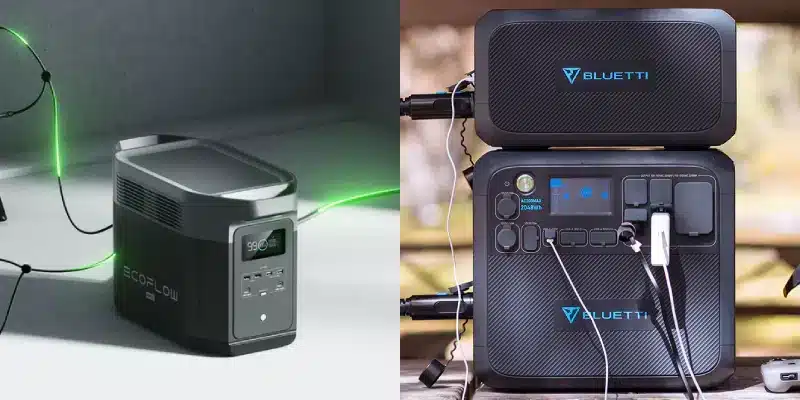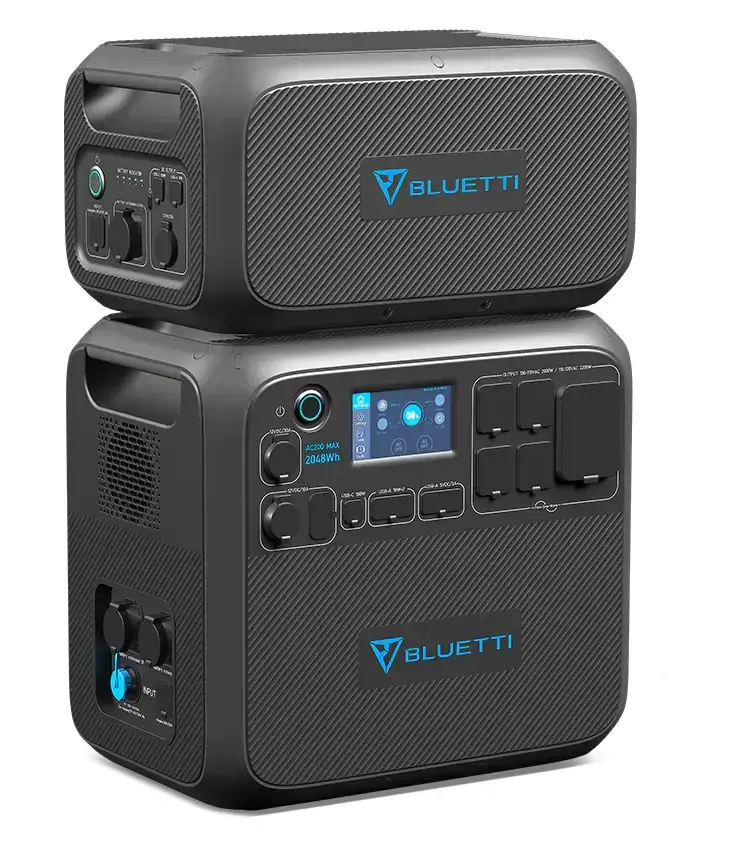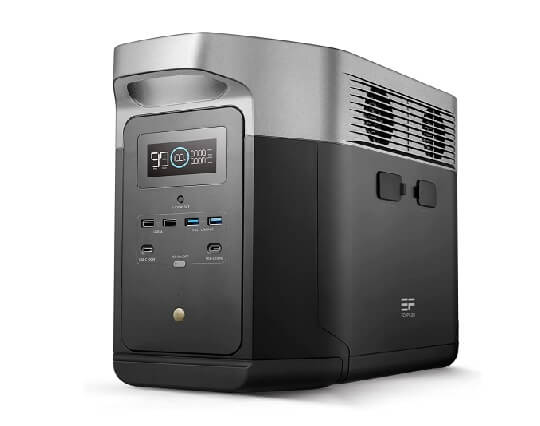
If you’re considering investing in a mid-size power station, you may be wondering which of the two main models is right for you: the EcoFlow or Bluetti? In this article, we look at Bluetti AC200 Max vs EcoFlow Delta 2 Max.
Both models are basically 2,048 Wh LFP power stations, but you can take both to higher capacities, which is interestingly the same capacity of 6,144 Wh (thanks to the dual B230 for AC200 Max). If you have two B300 extra batteries, the AC200 Max can be taken to a further higher 8,192 Wh.
When it comes to inverter power, the EcoFlow slightly outplays its Bluetti alternative. It has a 2400W inverter and highlights the much-touted X-Boost mode to achieve 3400 watts. The Bluetti has a 2200W power station with no specific inverter power booster. So, the reason why customers are looking for a comparison of these two models is that you get two mid-size power stations with the same basic power and scalability range.

Bluetti AC200 Max

EcoFlow Delta 2 Max
| Specification | EcoFlow DELTA 2 Max | BLUETTI AC200MAX |
|---|---|---|
| Battery Chemistry | Lithium Iron Phosphate (LFP) | Lithium Iron Phosphate (LiFePO4) |
| Capacity | Expandable from 2kWh to 6kWh | Expandable from 2,048Wh to 6,144Wh with B230, or 8,192Wh with B300 |
| Life Cycles | 3,000+ cycles to 80% capacity | 3,500+ cycles to 80% capacity |
| Inverter Output | Up to 3400W (with X-Boost) | Continuous 2,200W, surge 4,800W |
| AC Outlets | 6 AC outlets | Multiple AC outlets |
| Maximum Solar Input | 1000W | 900W |
| Recharge Time | Approximately 2.3 hours (dual AC+Solar charging) | Varies based on recharge method |
| MPPT Efficiency | 99% | Not specified |
| Charging Methods | Dual AC+Solar charging | Seven methods including AC, solar, car, generator, others |
| App Connectivity | EcoFlow app for energy management | BLUETTI app for remote monitoring and management |
| Ports | Details not provided | Includes PV (solar) input port, AC adapter input, car charging port, etc. |
| Durability Features | Rubber anti-slip base, UL94-5VA fire-resistant casing | Durable materials for indoor and outdoor use |
| Expandable Capacity | Allows connection of up to two DELTA 2 Max Smart Extra Batteries | Compatible with B230 and B300 expansion batteries |
| Warranty | 5-year warranty | Warranty details not provided |
| Certifications | Not specified | Not specified |
| Weight/Dimensions | Compact design; specific dimensions and weight not provided | 16.5 x 11.0 x 15.2 inches; approx. 61.9 pounds |
| Environmental Adaptability | Safe from most environmental/usage-related risks | Not waterproof, should not be exposed to moisture or water |
But what else can you expect from each? Let’s delve more into their specs to see how they differ from each other in charging options, outputs, weight, size, and more. The EcoFlow is relatively lightweight and portable, weighing just 37 pounds and measuring 19.6 x 10.6 x 14.2 inches. It also features two AC outputs, two fast-charging USB-C ports, and four USB-A ports. This is perfect for camping trips, tailgates, and other outdoor activities.
Meanwhile, the Bluetti is slightly larger and heavier at 44 pounds and 20.9 x 8.5 x 14.3 inches. It also offers two AC outputs, three USB-C ports, and three USB-A ports for charging multiple devices at once. Both are great for powering devices on the go, but the Bluetti offers more charging options.
Ultimately, both the EcoFlow and Bluetti make great mid-size power stations for those who want a reliable and portable power source. The EcoFlow is lightweight and portable, while the Bluetti offers more charging ports for powering multiple devices at once. Deciding which one is best for you will depend on your personal needs and preferences.
Solar and AC Charging Inputs
The upgraded Delta 2 Max has a clear edge over the Bluetti AC200 Max when it comes to solar and AC charging inputs. With a wall socket charging rate of 1800 watts, and 1000 watts and 500 watts from its dual and single solar ports respectively, the Delta 2 Max is miles ahead of the Bluetti’s AC input of 900 watts and solar input of 500 watts. Additionally, the Delta 2 Max features the X-Stream AC charging feature for improved performance. Both batteries can also be charged via USB-C, DC carports, and more.
Charging Outlets
The EcoFlow Delta 2 Max offers a greater range of charging outlets than the Bluetti AC200 Max. The Delta 2 Max includes six AC outlets, dual USB-A, USB-C, and USB-A fast-charge ports, two DC5521 ports, and a 12.6V carport. Meanwhile, the Bluetti provides four AC sockets in addition to a 120V/30A NEMA TT-30 port, two USB-A 5V/3A and USB-A 18W ports, and a single USB-C 100 port. To stand out from its competitor, the Bluetti AC200 Max includes a 15-watt wireless charger.
Price and Availability
The Bluetti AC200 Max offers a more affordable price tag than its EcoFlow rival. The primary unit of the AC200 Max is currently listed at $1499, while the Delta 2 Pro is $1699. In terms of extra batteries, a single unit of Bluetti’s B230 extra battery costs $1399, while the more recent B300 is priced at $1999. Meanwhile, the Delta 2 Max Smart Extra battery costs the same as a B230, which is $1399. Both brands provide multiple bundles with additional batteries, solar panels, and other accessories. The power stations can be easily purchased on their respective websites or from retail sites such as Amazon.
The Upgraded Delta 2 Max vs. Original Delta Max
The Delta 2 Max is an upgrade to the original Delta Max, and features a longer-lasting lithium iron phosphate (LFP) battery and greater storage capacity. The original Delta Max comes in two variants: the Delta Max 2000 and Delta Max 1600, with 2016 Wh and 1612 Wh lithium battery packs. The Delta 2 Max was designed to be a direct competitor to the Bluetti AC200P, and it has a clear advantage over its rival with higher solar and AC charging speeds.

Bobby is a part-time blogger who is highly passionate about off grid and sustainable power systems and is an expert at researching and exploring new topics, checking facts, and presenting things in simple language. As an avid observer of the global off grid power and battery market, he is really excited to share with you the latest trends, fresh products, and other developments in the markets.
